Does Green Tea Stain Your Teeth? Which Teas Stain, How to Prevent and Remove Stains?
Does Green Tea Stain Your Teeth? Which Teas Stain, How to Prevent and Remove Stains?
Table of Contents
Many of us wonder if tea stains your teeth. Tea has been loved for centuries, with its colors ranging from green to black. Questions like does green tea stain your teeth spark debate. The American Dental Association says tea is good but can stain our teeth. But does it really? Healthline and the British Dental Journal have looked into this. They help us understand if tea can stain and how to stop it.
Tea and Dental Health: Is Tea Good for Your Teeth?
Tea is one of the most popular beverages worldwide, and while it offers numerous health benefits, many people wonder if drinking tea is good or bad for their teeth. In this article, we’ll explore the impact of different types of tea on your dental health and recommend the best tea for healthy teeth and gums.
Is Tea Good for Your Teeth?
Tea contains natural compounds that can have both positive and negative effects on your dental health. The impact of tea on your teeth depends on factors such as the type of tea you drink, how often you drink it, and your overall oral hygiene habits.
Positive Effects of Tea on Dental Health:
- Tea contains antioxidants and polyphenols that may help reduce the growth of harmful bacteria in the teeth.
- Some studies suggest that tea can contribute to healthier gums and a lower risk of gum disease.
- Certain types of tea, like green tea, have anti-inflammatory properties that could potentially benefit oral health.
Negative Effects of Tea on Dental Health:
- Staining: Tea, especially dark teas like black tea, contains tannins that can cause discoloration on your teeth over time.
- Acidity: The acidity in some teas can weaken enamel, leading to increased sensitivity and a higher risk of cavities if not managed properly.
Is Green Tea Good for Your Teeth?·
Green tea is often regarded as one of the best types of tea for your teeth. The polyphenols in green tea, particularly catechins, have antibacterial and anti-inflammatory properties, which may help fight harmful bacteria in the mouth and reduce the risk of cavities and gum disease. Green tea has also been shown to promote fresh breath and reduce plaque buildup, which can contribute to healthier teeth and gums.
Unlike black tea, green tea is much less likely to stain your teeth due to its lower tannin content. However, it is still important to rinse your mouth with water after drinking green tea to minimize any potential staining or acidity effects.
Is Black Tea Good for Teeth and Gums?
Black tea, while rich in antioxidants, has a higher tannin content compared to green tea, which makes it more likely to stain your teeth. Staining from black tea occurs when tannins bind to the tooth enamel, leaving behind a yellowish or brownish tint. Regular consumption of black tea without proper oral care can lead to more noticeable staining over time.
On the positive side, black tea has been shown to improve oral health by reducing plaque formation and fighting harmful bacteria in the mouth. Some studies suggest that black tea can help reduce the risk of gum disease and cavities when consumed in moderation. To minimize staining, consider drinking black tea in moderation and practicing good oral hygiene.
Best Tea for Teeth Health
If you’re looking to maintain healthy teeth and gums while enjoying a cup of tea, green tea is the best option. It’s packed with antioxidants, supports gum health, and is less likely to cause staining compared to black tea. Such as Longjing tea and Biluochun tea. Additionally, herbal teas like chamomile, peppermint, and rooibos are excellent choices for those who are concerned about staining, as they typically contain fewer tannins and are gentle on tooth enamel.
For the best dental health, it’s important to combine tea drinking with a good oral hygiene routine. Brushing your teeth at least twice a day, flossing, and visiting the dentist regularly can help reduce the risks associated with tea consumption, such as staining and enamel erosion.
Does Tea Stain Your Teeth?
Yes, tea can stain your teeth, especially darker teas like black tea and oolong tea. The main culprit behind staining is tannins, compounds found in tea that can cause discoloration over time. Green tea and white tea are less likely to stain your teeth, but regular consumption without proper oral care may still lead to mild staining. To minimize staining, practice good oral hygiene and drink tea in moderation.
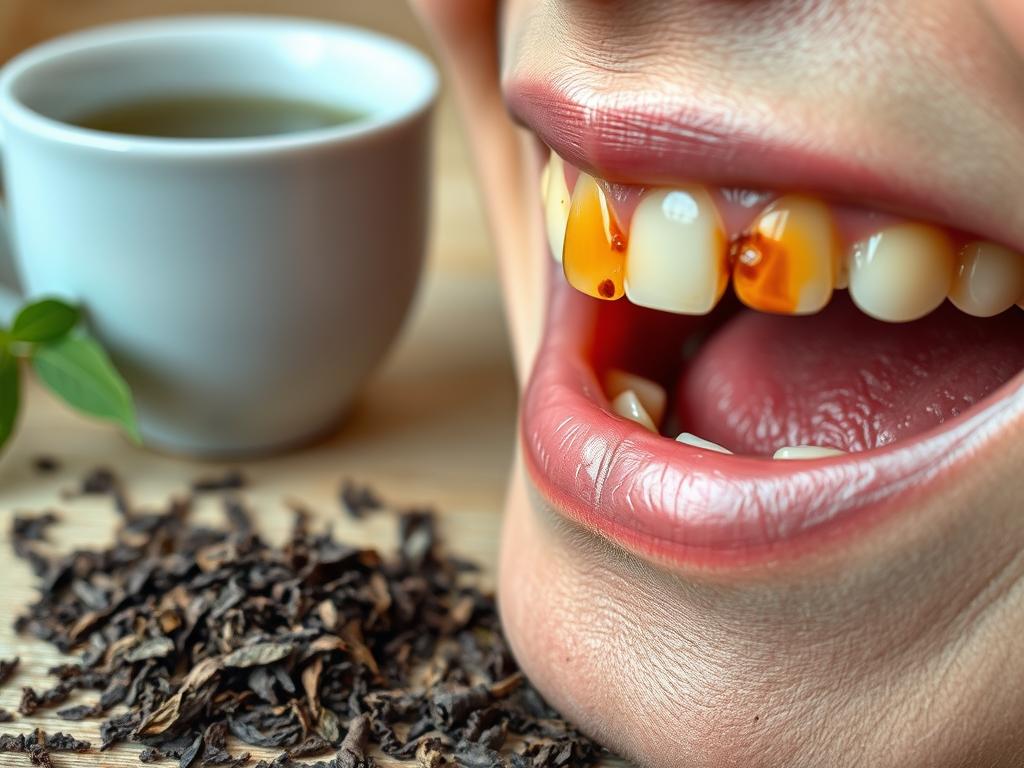
How Does Drinking Tea Stain Your Teeth?
Tea stains your teeth because tannins attach to the surface of your enamel. Tooth enamel is porous, and tannins cling to these tiny openings, causing stains that can range from yellowish to brown. The darker the tea, the higher its tannin content, which makes black tea the most common culprit for staining. Even green tea, which has fewer tannins, can still cause staining with regular consumption.
In addition to tannins, the acidity of tea plays a role in staining. The acid in tea can soften your enamel temporarily, making it more susceptible to staining. Over time, the enamel weakens, and the staining agents from tea are able to penetrate deeper into your teeth, causing more noticeable discoloration.
Comparing Tea Varieties: Staining Potential of Each Type
When it comes to tea and your teeth, staining potential varies significantly across different tea types. While some teas are more likely to cause discoloration, others have less impact. Does tea stain your teeth? The answer depends on the tea you drink. In this section, we’ll explore how various tea varieties—such as black tea, green tea, white tea, oolong tea, pu erh tea, and herbal teas—affect the color of your teeth, highlighting their staining potential and the factors that contribute to discoloration.
Does Drinking Green Tea Stain Your Teeth?
Yes, drinking green tea can stain your teeth, but the staining potential is lower compared to darker teas like black tea. Green tea contains fewer tannins, which are the compounds responsible for discoloration. However, with regular or excessive consumption, it can still lead to mild staining, especially if oral hygiene is not properly maintained. To minimize staining, rinse your mouth after drinking and brush your teeth regularly.
Why Does Green Tea Stain Your Teeth Less?
The main reason green tea causes less staining than darker teas is its lower tannin content. Tannins are natural compounds found in tea that contribute to its flavor but also cause staining. Black tea and pu erh tea have significantly more tannins, which makes them more likely to cause noticeable discoloration. In contrast, green tea contains fewer tannins, so the staining effect is less intense and takes longer to develop.
Another factor is that green tea is less acidic than darker teas. The acidity in tea can weaken enamel, making it more susceptible to staining. Since green tea is milder in acidity, it doesn’t soften your enamel as much, reducing the chances of stains setting in.
Does Matcha Green Tea Stain Teeth?
Yes, matcha tea can stain your teeth, but when compared to other types of green tea, the staining potential of matcha is generally higher due to its unique characteristics. However, it still stains teeth less than black tea or pu erh tea.

Why Does Matcha Tea Stain Teeth More Than Regular Green Tea?
Matcha differs from regular green tea in that it is made from powdered whole tea leaves, rather than just steeping leaves in water. This means when you drink matcha, you are ingesting the entire tea leaf, which increases the concentration of tannins, catechins, and chlorophyll in the drink. These compounds are known to bind to tooth enamel and can lead to staining over time. Besides,Since matcha is in powdered form, it remains in direct contact with your teeth longer than liquid teas. This prolonged exposure can increase the likelihood of staining.
Does Oolong Tea Stain Teeth?
Yes, oolong tea can stain your teeth, but its staining potential depends on the specific fermentation and roasting levels of the oolong tea. Compared to other teas like black or green tea, oolong tea falls somewhere in between in terms of staining risk.
Staining Potential of Oolong Tea
Oolong tea is partially fermented, which means its tannin content is higher than green tea but generally lower than black tea. The degree of fermentation plays a significant role in the staining potential of oolong tea:
- Lightly Fermented Oolong: These teas, which have less oxidation, tend to have fewer tannins and are therefore less likely to stain your teeth. Such as Tieguanyin tea. Their milder flavor and lighter color result in a lower staining potential compared to darker oolongs.
- Heavily Fermented Oolong: Oolong teas with higher fermentation levels (closer to black tea) have more tannins and stronger pigments, which can lead to greater staining potential. These teas are darker in color and tend to be more acidic, making them more likely to contribute to tooth discoloration if consumed regularly.
- Roasted Oolong: Some oolong teas are roasted to enhance their flavor like Da Hong Pao tea, and the roasting process can also affect the staining potential. Roasted oolong teas tend to have a deeper color and stronger taste, which may increase the likelihood of staining compared to unroasted oolongs.
Does White Tea Stain Teeth?
Very light, White tea is one of the least likely teas to stain your teeth. Compared to other types of tea, white tea has a very low staining potential, making it a great choice for those concerned about keeping their teeth white and bright.
Why Does White Tea Cause Less Staining?
The primary reason white tea stains your teeth less is its low tannin content. Tannins are compounds found in tea that can bind to the enamel on your teeth and cause discoloration. Since white tea is minimally processed and undergoes little oxidation, it retains fewer tannins compared to darker teas like black tea. As a result, white tea has a much gentler impact on tooth color.
Additionally, white tea is generally less acidic than many other teas, which further reduces the risk of enamel erosion. Enamel erosion can make teeth more susceptible to staining. The lower acidity of white tea helps maintain your enamel’s strength and resistance to stains.
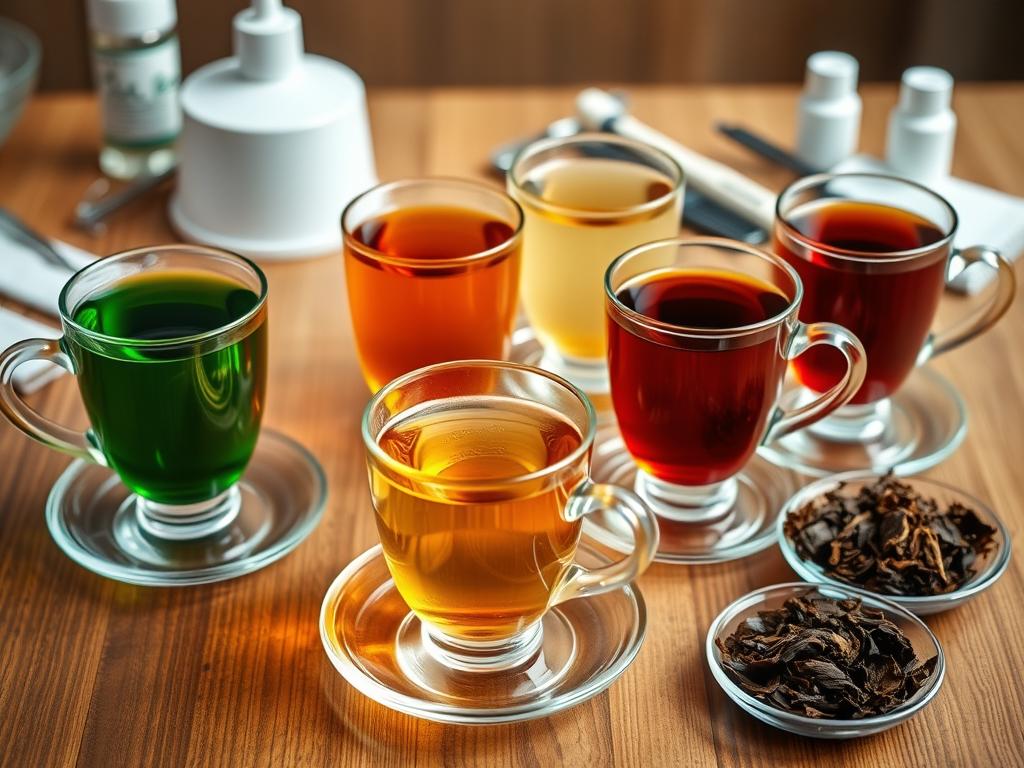
Does Pu Erh Tea Stain Teeth?
Yes, pu erh tea can stain your teeth, and its staining potential depends on whether you’re drinking Ripe pu erh (熟普洱) or raw pu erh (生普洱). Both types of pu erh tea have the ability to discolor teeth, but the degree of staining differs due to their unique processing methods.
Staining Potential of Pu Erh Tea
- Ripe Pu Erh (熟普洱): Ripe pu erh is fermented and has a stronger color and richer taste, which contributes to a higher staining potential. The fermentation process increases the concentration of tannins and pigments, both of which can adhere to tooth enamel. As a result, drinking aged pu erh tea regularly can lead to noticeable staining, especially if oral hygiene is not maintained.
- Raw Pu Erh (生普洱): Raw pu erh, on the other hand, is less oxidized and has a lighter color compared to aged pu erh. While it still contains tannins, its staining potential is generally lower than that of aged pu erh. However, raw pu erh can still cause staining if consumed frequently, as its naturally occurring pigments and tannins can bind to enamel over time. Raw pu erh can also be more acidic, which may slightly contribute to enamel wear, making it easier for pigments to settle.
| Tea Type | Staining Potential | Reason | Tannins Content | Acidity |
|---|---|---|---|---|
| Black Tea | High | Rich in tannins and pigments, which easily stain teeth. | High | High |
| Green Tea | Moderate | Contains fewer tannins than black tea, but still stains over time. | Moderate | Low to Moderate |
| Matcha Tea | Moderate to High | Powdered form increases tannin and chlorophyll exposure to enamel. | High | Low |
| Oolong Tea | Moderate | Staining potential varies depending on fermentation level (light vs dark). | Moderate | Moderate |
| White Tea | Low | Low tannin content and less acidity, leading to minimal staining. | Low | Low |
| Pu Erh Tea | High | Aged or fermented versions have high tannins and pigments, causing stains. | High | Moderate to High |
Does Herbal Tea Stain Teeth?
Generally, herbal teas are less likely to stain your teeth compared to traditional teas like black or green tea. This is because most herbal teas have lower tannin content, the compound most responsible for causing stains on teeth. However, certain herbal teas can still cause mild staining, especially if consumed in large amounts or without proper oral care.
While herbal teas are generally gentler on your enamel, the potential for staining can vary depending on the specific herbs used. Some herbal teas contain pigments or other compounds that can still leave a slight discoloration on your teeth, particularly with frequent consumption. Now, let’s explore the staining potential of some popular herbal teas:
- Does Chamomile Tea Stain Teeth? Chamomile tea is unlikely to stain your teeth. It has low tannin levels and doesn’t contain strong pigments that would cause discoloration. It’s a gentle herbal tea that’s generally safe for your teeth, so you don’t have to worry much about staining.
- Does Peppermint Tea Stain Teeth? Peppermint tea also has a low risk of staining your teeth. Like chamomile, peppermint tea lacks significant amounts of tannins, which means it doesn’t leave behind the compounds that typically cause tooth discoloration. It’s refreshing and safe for your enamel.
- Does Rooibos Tea Stain Teeth? Rooibos tea, also known as Redbush tea. despite its rich reddish color, has no tannins and is therefore unlikely to stain your teeth. It’s a great option for those looking for a flavorful tea that won’t cause discoloration. However, drinking any tea excessively without oral care could still lead to mild staining over time.
- Does Turmeric Tea Stain Teeth? Turmeric tea is more likely to stain your teeth due to its yellow pigment called curcumin. This powerful antioxidant can leave yellowish stains on your enamel, especially with regular consumption. It’s recommended to rinse your mouth after drinking turmeric tea or brush your teeth to minimize staining.
- Does Hibiscus Tea Stain Teeth? Hibiscus tea can cause mild staining due to its deep red color. While it doesn’t contain tannins, its strong pigments can stick to your enamel and lead to slightly red or purple stains over time. It’s not as harsh as black tea, but if consumed frequently, it may cause discoloration. Rinsing your mouth after drinking it can help prevent staining.

How to Prevent Tea Stains on Teeth?
1. Brush Your Teeth After Drinking Tea
One of the most effective ways to prevent tea stains on your teeth is to brush your teeth soon after drinking tea. Tea contains tannins—the compounds responsible for staining—and brushing removes them before they can cling to your enamel. If you can’t brush right away, try rinsing your mouth with water to wash away any lingering tea particles.
Tip: Wait at least 30 minutes after drinking tea before brushing. Tea, especially black tea, can soften the enamel temporarily, and brushing too soon could damage it.
2. Use a Straw
Drinking tea through a straw can be an easy way to prevent tea stains on your teeth. By bypassing direct contact between the tea and your enamel, you reduce the chances of staining. This is particularly helpful for people who drink tea frequently, as it minimizes the time the tea stays on your teeth.
3. Drink Water After Tea
Another simple yet effective method to prevent tea staining is to rinse your mouth with water after drinking tea. Water helps wash away tea residues, pigments, and tannins that might have settled on your teeth. This simple step significantly reduces the chances of staining when done regularly.
4. Limit Tea Consumption
While this might not be the most appealing solution for avid tea drinkers, limiting tea consumption is an effective way to prevent staining. The more often you drink tea, the greater the exposure to tannins and pigments. Consider reducing the number of cups you drink per day or replacing some tea sessions with beverages like water or herbal teas that are less likely to stain.
5. Choose Lighter Teas
If you love tea but want to avoid staining, consider switching to lighter teas like white tea or green tea. These teas generally contain lower levels of tannins and have a milder effect on tooth discoloration. While no tea is completely stain-free, lighter teas are much less likely to cause noticeable stains compared to stronger teas like black tea or herbal teas with deep red colors (e.g., hibiscus).
6. Opt for a Tooth-Friendly Tea Routine
Limit Tea Consumption Throughout the Day, Instead of drinking several cups of tea in a short period, try to reduce the frequency of tea drinking throughout the day. Spacing out your tea intake too much can prolong the exposure of your teeth to staining agents. By having fewer cups per day, you minimize the overall contact time between your teeth and the compounds in tea, ultimately reducing the risk of staining.Additionally, pairing tea with meals can help minimize its impact on your teeth since food can help buffer some of the tea’s pigments and acids.
7. Regular Dental Cleanings
Even with the best oral care habits, some tea staining can still occur over time. To keep your teeth looking their best, it’s essential to visit your dentist regularly for professional cleanings. Dental cleanings can remove surface stains and polish your enamel, helping restore your teeth to their natural whiteness.
8. Use Whitening Toothpaste
For added protection, consider switching to a whitening toothpaste. These toothpastes contain mild abrasives that help scrub away surface stains caused by tea and other foods. Regular use of whitening toothpaste can prevent tea stains from building up and keep your teeth looking bright and clean.
9. Chewing Sugar-Free Gum
After drinking tea, chewing sugar-free gum can help stimulate saliva production, which naturally helps to neutralize acids and wash away food particles. The increased saliva flow can help prevent tea residues from sticking to your teeth.
To stop tea staining your teeth, the most important thing is to stay proactive in your oral hygiene routine. Brushing, rinsing with water, and drinking tea through a straw are all simple but highly effective methods. If you find that stains have already set in, a regular cleaning routine at the dentist and the use of whitening toothpaste can help remove them. By making these habits part of your daily routine, you can continue to enjoy your favorite teas without worrying about the long-term effects on your smile.
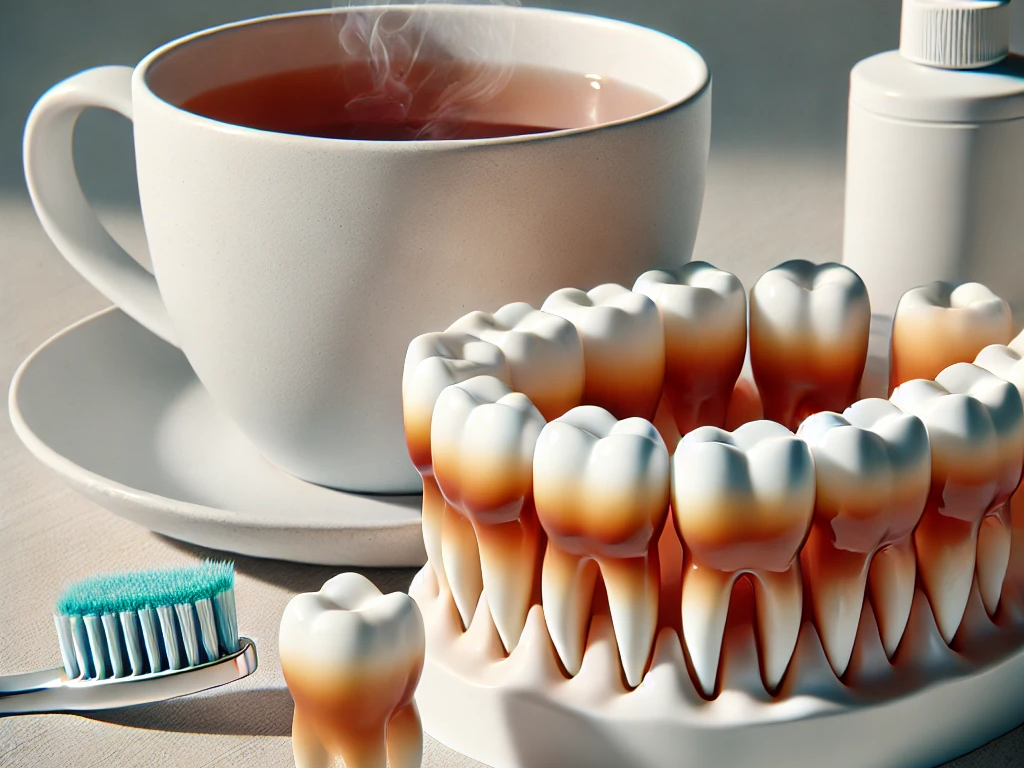
How to Remove Tea Stains from Teeth?
Tea stains on teeth are common, but the good news is that they can be removed with the right approach. Here are some simple and effective methods to get rid of tea stains on your teeth:
1. Brush Regularly with Whitening Toothpaste
One of the easiest ways to remove tea stains from teeth is by using whitening toothpaste. These toothpastes contain mild abrasives and chemical agents that can help scrub away surface stains caused by tea. Brush at least twice a day to gradually lighten tea stains and maintain a clean, bright smile.
2. Baking Soda and Hydrogen Peroxide
A popular natural remedy for tea stains is a mixture of baking soda and hydrogen peroxide. Baking soda acts as a gentle abrasive, helping to scrub away stains, while hydrogen peroxide is a mild bleaching agent that can help whiten your teeth. To use, mix a small amount of baking soda with hydrogen peroxide to form a paste, and brush your teeth with it. Be cautious not to overuse this method, as it can wear down enamel if done too often.
3. Oil Pulling with Coconut Oil
Oil pulling is an ancient technique that can help remove stains and improve oral hygiene. Using coconut oil, swish a tablespoon around in your mouth for 10-15 minutes. The oil helps to remove bacteria and can lighten tea stains naturally. While it may not completely remove deep stains, regular oil pulling can help prevent future discoloration.
4. Use Activated Charcoal
Activated charcoal is another natural way to remove tea stains from teeth. Charcoal has adsorptive properties that can attract and remove surface stains. Wet your toothbrush, dip it into activated charcoal powder, and brush gently. Be sure to rinse thoroughly afterward. This method is effective, but use it sparingly, as it can be abrasive over time.
5. Visit Your Dentist for Professional Whitening
If home remedies don’t fully remove tea stains, consider seeing your dentist for professional whitening treatments. Dentists can offer stronger whitening solutions that can tackle stubborn stains and brighten your smile. Professional cleanings can also help remove plaque buildup, which may contribute to staining.
6. Rinse with Apple Cider Vinegar
Apple cider vinegar has natural acidic properties that can help break down stains on your teeth. To use, dilute a small amount of apple cider vinegar with water and swish it around your mouth for a few seconds. Make sure to rinse thoroughly with water afterward. This method can help get rid of tea stains on teeth naturally, but it should be used in moderation, as the acidity can erode enamel if overused.
7. Eat Crunchy Fruits and Vegetables
Eating crunchy fruits and vegetables like apples, carrots, and celery can help scrub away stains as you chew. These foods act as natural abrasives, removing plaque and surface stains. They also stimulate saliva production, which helps neutralize acids and wash away food particles that can contribute to staining.
Remove Tea Stains from Teeth Naturally
Natural methods, such as using baking soda, activated charcoal, or apple cider vinegar, can effectively lighten tea stains without harsh chemicals. Combining these with good oral hygiene practices can help maintain a white smile while enjoying your favorite tea. Just remember to be gentle with your teeth to avoid damaging the enamel.
By following these tips, you can keep your teeth bright and reduce the impact of tea stains naturally.
Tea vs Coffee: Which Stains Teeth More?
When it comes to tea vs coffee in terms of staining your teeth, both beverages can lead to discoloration over time. However, one is more likely to cause staining than the other. Let’s explore which of these popular drinks has a greater impact on your smile.
Does Tea Stain Teeth More Than Coffee?
Yes, tea generally stains teeth more than coffee. Here’s why:
- Tannins in Tea – Tea contains tannins, compounds responsible for the majority of staining. These tannins can stick to your tooth enamel, making it more prone to discoloration. Black tea, in particular, has a higher tannin content than coffee, which increases the potential for staining.
- Types of Tea – Darker teas, such as black tea and pu erh tea, have a stronger staining effect due to their higher tannin levels. Even lighter teas, like green tea, can cause some discoloration, though to a lesser extent than black tea. Herbal teas like chamomile and peppermint are less likely to stain teeth compared to traditional teas.
- Acidity of Tea – Tea is also more acidic than coffee, which can wear down tooth enamel and make it more vulnerable to staining. The combination of acidity and tannin content makes tea a more significant threat to your tooth color than coffee.
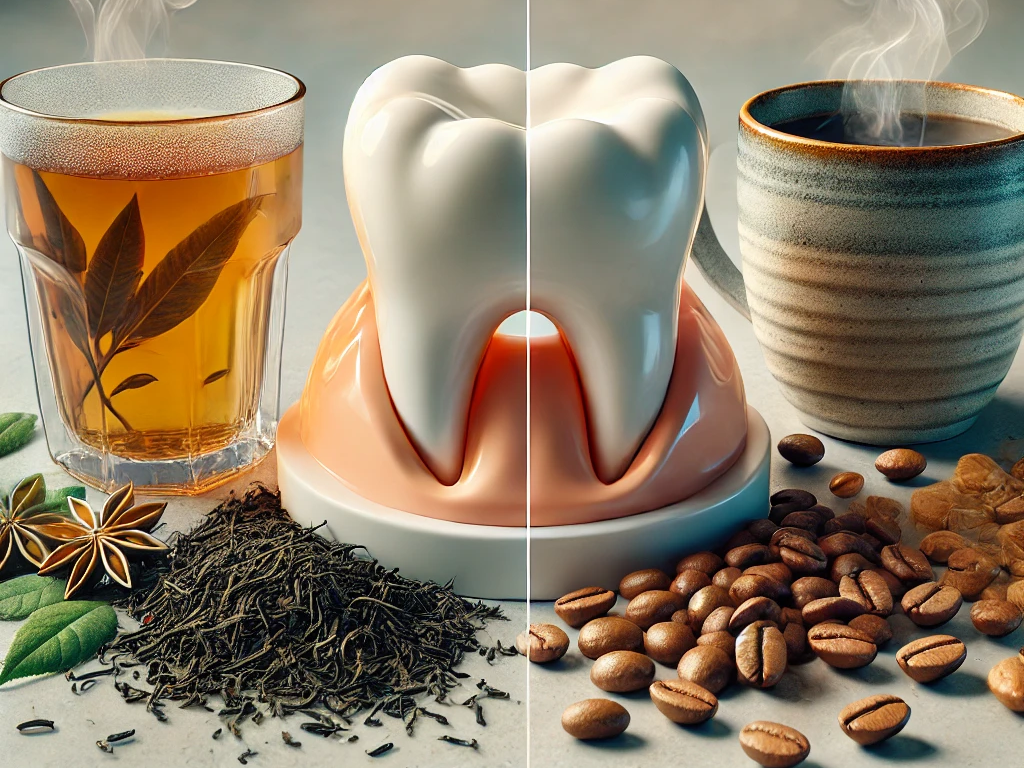
Does Coffee Stain Teeth?
Yes, but its effect is generally milder compared to tea. While coffee also contains some tannins, it is not as concentrated as in tea. Coffee is, however, slightly more acidic than most teas, which can contribute to enamel erosion over time, making the teeth more prone to staining.
Conclusion
Conclusion
Tea can be a delightful and healthy beverage choice, but it’s essential to be mindful of its potential effects on your teeth. While tea offers benefits like antioxidants and antibacterial properties, the tannins and acidity in some teas can lead to staining and enamel erosion.
By understanding the staining potential of different tea varieties, practicing good oral hygiene, and considering preventive measures like rinsing with water or using a straw, you can enjoy your tea without compromising your oral health. Remember that moderation and a consistent oral care routine are key to maintaining a healthy, bright smile while enjoying your favorite cup of tea.
If you have concerns about tea stains or any dental issues, consult your dentist for personalized advice and professional care.
Frequently asked questions
Yes, green tea can stain your teeth, though it generally causes less staining compared to darker teas like black tea. Green tea contains tannins, which are compounds that can stick to tooth enamel and cause discoloration over time. However, since green tea has lower tannin levels than black tea, its staining potential is relatively mild. To minimize staining, you can brush your teeth regularly, drink water after your tea, and consider using a straw.
Yes, drinking tea can stain your teeth. Teas like black tea and green tea contain tannins, which are compounds that can cause stains by sticking to your enamel. The staining may be more noticeable with frequent consumption, particularly if oral hygiene is not maintained. To avoid stains, you can rinse your mouth with water after drinking tea, brush your teeth regularly, and limit the number of cups you drink per day.
To avoid tea stains on your teeth, you can follow these simple steps:
- Drink less frequently: Reduce the number of cups you drink each day.
- Use a straw: Drinking tea through a straw reduces contact with your teeth.
- Rinse your mouth: After drinking tea, rinse with water to wash away staining compounds.
- Brush regularly: Maintain a good oral care routine by brushing with whitening toothpaste.
Regular dental check-ups: Get professional cleanings to remove any accumulated stains.
To remove tea stains from your teeth, start by using a whitening toothpaste that can gently remove surface stains. You can also try natural remedies like baking soda or activated charcoal to help lighten discoloration. Oil pulling with coconut oil is another effective method to reduce stains over time. For more stubborn stains, consider visiting a dentist for professional whitening treatments that can provide more effective results.
Yes, most herbal teas are less likely to stain your teeth compared to traditional teas like black or green tea. This is because herbal teas generally have lower tannin content, the compound responsible for staining. However, certain herbal teas like hibiscus or turmeric tea may still cause mild staining due to their strong pigments. Overall, herbal teas are a better option for those concerned about staining, but regular oral care is still important.
Yes, when comparing tea vs coffee, tea generally stains teeth more than coffee. This is due to its higher tannin content, which can adhere to the enamel and cause staining. While coffee also has staining potential, its pigments are less likely to cause as much discoloration as tea. Additionally, coffee tends to be more acidic, which can weaken enamel and make it more susceptible to staining from other foods and drinks.
Yes, matcha tea can stain your teeth, although its staining potential is generally milder compared to darker teas like black tea or pu-erh tea. Matcha, a powdered form of green tea, can stain teeth, although it typically causes less staining than black tea due to its lower tannin content. However, matcha still contains some tannins and can contribute to staining over time, especially with frequent consumption. To minimize staining, it’s best to brush your teeth after drinking matcha and drink plenty of water to rinse your mouth.
If you’re concerned about staining, white tea is the best option for your teeth. It has the lowest tannin content among all tea types, making it less likely to cause staining. Additionally, herbal teas like chamomile and peppermint are also good choices, as they contain minimal tannins and pigments. However, for optimal oral health, it’s important to maintain a good dental hygiene routine and drink tea in moderation.

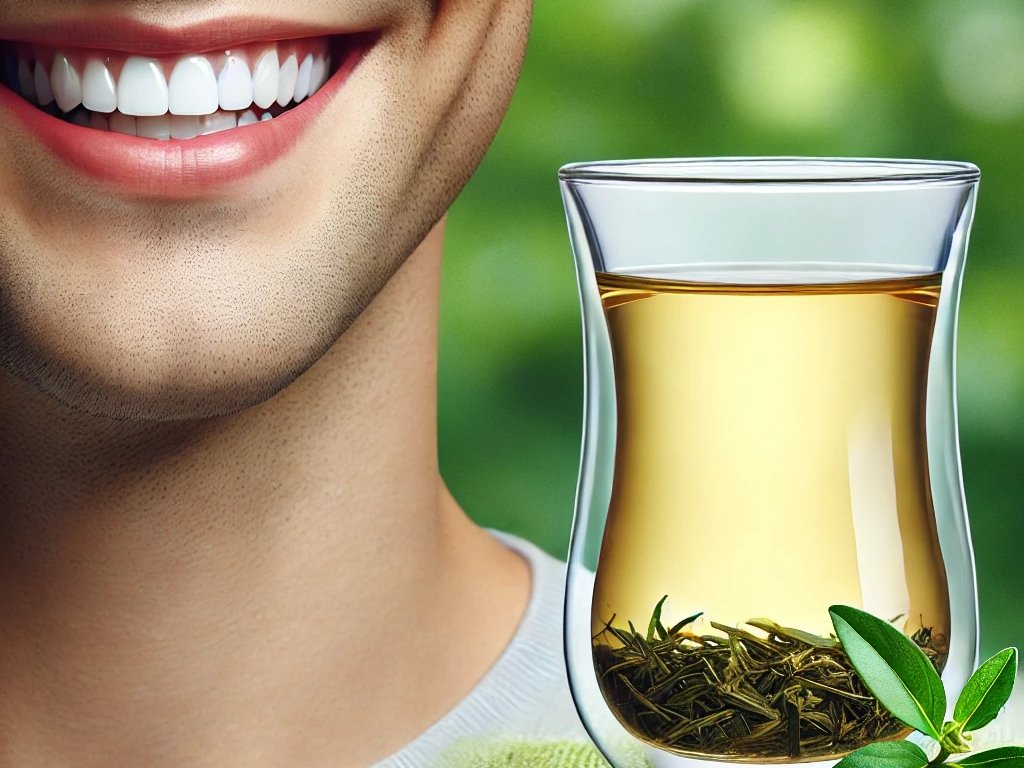


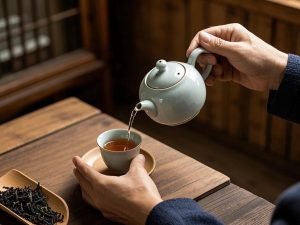

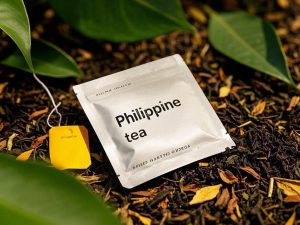

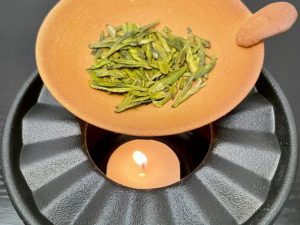

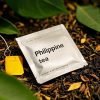



Leave a reply